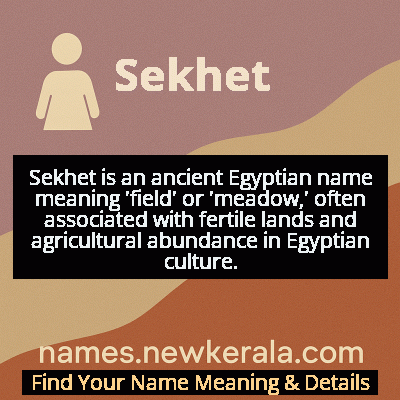Sekhet Name Meaning & Details
Origin, Popularity, Numerology Analysis & Name Meaning of Sekhet
Discover the origin, meaning, and cultural significance of the name SEKHET. Delve into its historical roots and explore the lasting impact it has had on communities and traditions.
Name
Sekhet
Gender
Female
Origin
Egyptian
Lucky Number
5
Meaning of the Name - Sekhet
Sekhet is an ancient Egyptian name meaning 'field' or 'meadow,' often associated with fertile lands and agricultural abundance in Egyptian culture.
Sekhet - Complete Numerology Analysis
Your Numerology Number
Based on Pythagorean Numerology System
Ruling Planet
Mercury
Positive Nature
Adventurous, dynamic, curious, and social.
Negative Traits
Restless, impatient, inconsistent, prone to indulgence.
Lucky Colours
Green, white.
Lucky Days
Wednesday.
Lucky Stones
Emerald.
Harmony Numbers
1, 3, 9.
Best Suited Professions
Sales, marketing, travel, entertainment.
What People Like About You
Versatility, charisma, adventurous spirit.
Famous People Named Sekhet
Sekhet of Memphis
Mythological Figure
Divine consort of Ptah, worshipped as goddess of fields and fertility
Sekhet-Hathor
Priestess
High priestess in temple of Hathor, commissioned agricultural reforms
Sekhet-Neferet
Royal Scribe
First documented female royal scribe, served under Hatshepsut
Name Variations & International Equivalents
Click on blue names to explore their detailed meanings. Gray names with will be available soon.
Cultural & Historical Significance
Archaeological evidence from temple reliefs at Karnak and Saqqara shows Sekhet depicted holding agricultural symbols - sheaves of wheat, lotus flowers, and irrigation tools. She was particularly venerated in the Memphis region, where her cult center stood adjacent to Ptah's main temple. During the annual Shemu harvest season, festivals honored Sekhet with processions where priests carried models of cultivated fields. Her importance extended to funerary practices, where the 'Field of Reeds' (Sekhet-Aaru) in the afterlife was conceptually linked to her domain, representing eternal abundance for the deceased.
Extended Personality Analysis
Individuals named Sekhet are typically perceived as nurturing, grounded, and practical. They embody the earth-mother archetype, displaying remarkable patience and resilience similar to agricultural cycles. Their personality often reflects the steady, life-giving qualities of cultivated land - reliable, fertile in ideas and creativity, and deeply connected to natural rhythms. They tend to be excellent caretakers and community builders, with an innate understanding of growth processes whether in relationships, projects, or personal development.
Sekhet-named individuals often demonstrate strong organizational skills and practical wisdom, mirroring the systematic nature of successful agriculture. They possess what ancient Egyptians called 'ma'at' - a sense of cosmic balance and harmony. While generally calm and steady, they can display fierce protectiveness when their 'fields' (whether family, projects, or principles) are threatened. Their strength lies in sustainable growth rather than quick victories, making them excellent long-term planners and guardians of tradition while remaining adaptable to necessary changes.
Modern Usage & Popularity
In contemporary times, Sekhet remains a rare but meaningful choice, primarily among families with Egyptian heritage or those drawn to ancient mythology. The name has seen a slight resurgence in the 21st century alongside growing interest in historical and mythological names. It's particularly popular in academic and artistic circles where parents seek names with deep cultural roots and positive agricultural symbolism. While not appearing in most national baby name databases due to its rarity, online name forums and Egyptian cultural organizations report increased inquiries about Sekhet. Modern bearers often appreciate the name's connection to sustainability, environmental awareness, and feminine strength rooted in nourishment rather than aggression. The name fits well with current trends favoring unique historical names with strong meanings and cross-cultural appeal.
Symbolic & Spiritual Meanings
Sekhet symbolizes the fundamental human relationship with the earth as source of life and sustenance. Metaphorically, she represents cultivated potential - the transformation of raw nature into organized, life-supporting systems. Her symbolism extends to intellectual and spiritual cultivation, where 'fields' represent areas of knowledge or personal growth that require careful tending. In psychological terms, Sekhet embodies the archetype of the nurturer who creates conditions for growth while respecting natural laws. Her connection to annual Nile floods adds layers of cyclical renewal, predictable abundance through preparation, and the wisdom of working with natural forces rather than against them. Modern environmental movements often draw unconsciously on Sekhet's symbolism when advocating for sustainable agriculture and respectful human-earth relationships.

